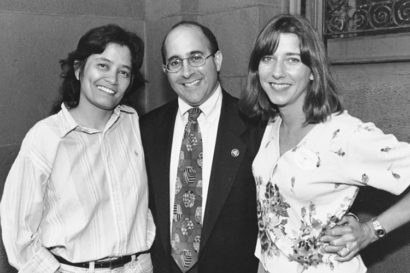How ‘Defense of Marriage’ became ‘Freedom to Marry’
The Oral History Center at the Bancroft Library chronicled how Freedom to Marry moved public opinion and the legal standing of same-sex marriage
April 13, 2017

Freedom to Marry founder Evan Wolfson with the plaintiffs in Baehr v. Miike (Hawaii, 1996), the first same-sex marriage case brought to trial. Photo courtesy of Marilyn Humphries.
In 1996, the year Congress passed the federal Defense of Marriage Act — which denied legally married same-sex couples the same protections and responsibilities afforded to different-sex couples — Gallup asked Americans: “Do you think marriages between same-sex couples should or should not be recognized as valid, with the same rights as traditional marriages?”
Sixty-eight percent of those polled responded negatively, 37 percent responded positively and 5 percent had no opinion.
Twenty years, a landmark Supreme Court ruling and 37 states affirming the freedom to marry for same-sex couples later, Gallup found that the numbers had essentially flipped: 61 percent in the affirmative, 37 percent negative, 2 percent without an opinion.
Key to that vast cultural and legal shift was Freedom to Marry, the national coalition that pushed for marriage equality on all fronts. The stories of more than 20 people in and around Freedom to Marry are the subjects of the latest project from the Oral History Center at UC Berkeley’s Bancroft Library. The oral histories document both the reversal in public opinion about marriage and the actions of the individuals and organizations that stoked those changes.
Details and nuances captured in the roughly 100 hours of recordings archived at the OHC are intended to keep the depth and color of the Freedom to Marry movement from fading over time.
“What we got out of these interviews,” says Oral History Center director Martin Meeker, “is an amazing amount of detail that is really fine-grained. We have access to details of the campaigns and the internal debates that will slip away over time because people just won’t remember them.”
Interviewers from the OHC worked extensively with key figures in the Freedom to Marry movement, including movement founder Evan Wolfson; Kate Kendell, executive director of the National Center for Lesbian Rights; James Esseks, director of the ACLU’s LGBT and HIV project; and Thalia Zepatos, Freedom to Marry’s “message guru.”
Wolfson, who was interviewed for more than 10 hours, is a significant figure in the movement and is of particular interest for the OHC’s project. Wolfson has been a leading thinker and strategist around the same-sex marriage cause. As a law student at Harvard in the 1980s, Wolfson produced a thesis advocating for same-sex marriage — a cause position that was not popular in the LGBT community at the time.
“In the ‘70s and early ‘80s, there were very few people, maybe only a handful, that were advocating extending marriage to same-sex couples — including gay people,” explains Meeker. “Most gay people at the time were more in line with abolishing marriage rather than extending it. Marriage was viewed as a tool of the patriarchy, yet here was this young law school student producing a smart and interesting argument why same-sex marriage shouldn’t just be on the agenda of the gay movement, but at the top of it.”
The Freedom to Marry project chronicles the evolution of that idea and the many successes and setbacks along the way, including numerous legal and legislative challenges to same-sex marriage. Legal cases like the first-ever trial over same-sex marriage (Hawaii’s Baehr v. Lewin) and the U.S. Supreme Court’s 2015 decision in Obergefell v. Hodges are put under a microscope by the people who worked closely on the cases. Legislative action and political maneuvering, such as the passage of California’s anti-same-sex-marriage Proposition 8 in 2008 and the role of congressional Republicans and the Tea Party movement of 2010, are also told in tremendous detail.
“What an oral history project does,” says Meeker, “is it allows key individuals to speak in their own words about the work they did and reflect on the significance of that work. A lot of the interviews go into some of the more difficult or more personal moments of success or failure. These are things that aren’t spoken about publicly, but they’re a part of the history. We’re documenting things that almost certainly wouldn’t have been seen or heard otherwise.”
The OHC’s Freedom to Marry project is available now on the Bancroft Library’s website, as are Meeker’s thoughts on how lessons of Freedom to Marry can be applied to similar movements arising in response to the election of President Trump.
Additionally, Meeker and the OHC will host a brown-bag lunchtime presentation on how narrative can be employed as a strategy for social change in Room 267 of the Bancroft Library on Monday, April 17.